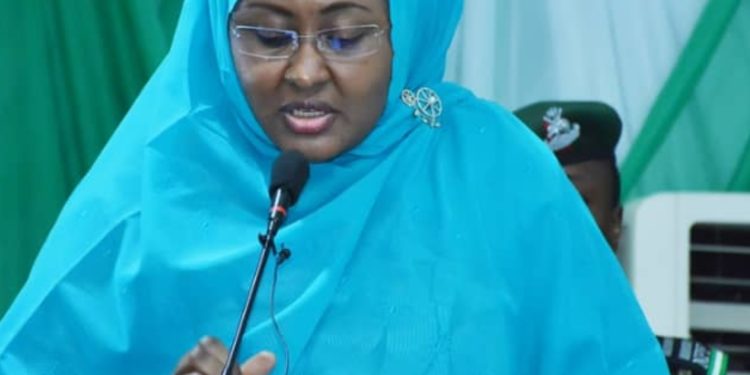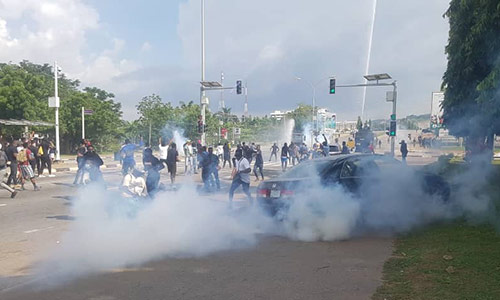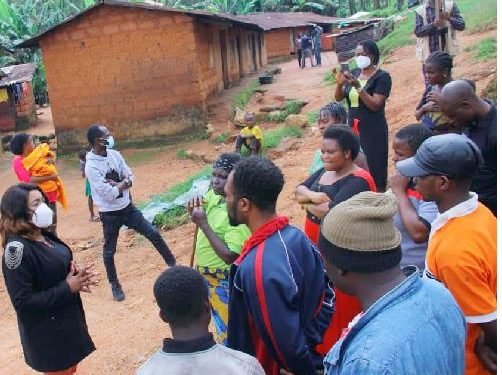The lives and dignity of female children have been subjected to gross abuse in Becheve, a community in Obanliku Local Government Area, Cross River State, for ages. An age long traditional practice allows the betrothal of underage girls, including unborn ones, to men who in some cases are old enough to be their grandfathers. The practice popularly known as money woman has not abated in spite of the adoption of the Child’s Rights Act by the state in 2009. Many innocent girls who are victims of the abusive practice are betrothed to their would-be husbands while they are still in their mothers’ wombs. Unfortunately, they are often denied access to basic education and treated as slaves by the aged hubbies. INNOCENT DURU reports that apart from the social deprivations they suffer, the hapless girls are dying from Vesico Virginal Fistula (VVF), among other health challenges.
- How men trade their innocent nieces into marriages to settle debts
- Why baby brides can’t break tradition –Monarch
- Victims denied basic education, regarded by in-laws as private property
- Health commissioner says they are dying in hundreds from VVF, other health challenges
It sounded like another Alice in the Wonderland tale, but Lovelyn (surname withheld) meant every word as she shared her ugly life experience. She was betrothed to an aged man while she was still in her mother’s womb and only escaped the servitude that would have been her lot by jumping out of the unholy arrangement.
“They told my mother while she was carrying my pregnancy that if I came out as a female child, I would be given out to the man as his wife,” said Lovelyn.
“It is no fiction; it is what happens in Becheve. As we speak, many innocent girls in the town are going through hell because of the practice, which they call money woman.”
Asked why her parents would agree to that kind of arrangement, Lovelyn said her father died a few days after she was born while her mother had no choice in the matter but comply with the agreement.
She said: “The betrothal process began immediately she gave birth to me, although I was still with my family. It was my mother’s family that gave me out to the man because my father had died a few days after I was born.
“My bride price was paid; I think it was about N40,000 or N50,000. The man was already above 60 years and going to 70. The only attraction is always the money. Once they see some small money, they will give their daughters out to the man that desires her.”
The smart girl that she was, Lovelyn had noticed how the practice had crippled the lives of many other girls around the community, so she began to plot her escape from the web of tradition she was entangled in if only to achieve her dream of going to school.
Recalling her escape from the forced marriage, she said: “When it was time for them to come and take me away, I made an arrangement with one Pastor Richard for my escape.
“I have many friends whose future was ruined by the practice. I remember Vivian, Charity, Jeniffer and Jacintha, to mention a few.
“Many girls who are only 14 or 15 years old are already giving birth from their forced marriages. Those of us that escaped with help from Pastor Richard have every reason to thank God.”
After her escape from Becheve, Lovelyn, who has since taken refuge in a Southwest state, was enrolled in a school. Now a senior secondary school (SSS) pupil, she says her ambition is to go to the university to study Law.
“I thank God that I can now read and write,” she said with a smile betraying excitement.
“I am in senior secondary school 2 going to SSS 3. If I had been married to the man, I would never have gone this far academically and my dream of going to a higher institution would have been dashed for life.
“I just thank God for using Pastor Richard to save me and others from their hands.”
But there is a part that still makes Lovelyn sad. She said while she is free, her elder sister is going through hell as a result of the traditional practice.
“She was a very brilliant girl and she had hoped to go far with her education, but she had her dream shattered when she was in primary three, as she was given out in marriage at that age.
“She is only 22 years old now, but she already has four children. She was married off at the age of 11. She had her first child at the age of 15.
“The man’s family had taken her away to Abuja when she was 11 and later brought her back to the man.
“There are many young girls who are not happy being in marriage but they cannot stop it. This is why we are calling on the government to help us stop the practice.”
Investigation conducted by our correspondent revealed that the case of Lovelyn has inspired many girls in the ugly arrangement to flee Becheve. One of them, Faith, who spoke from self-exile in a South-south state, recalled how she was given out as a replacement for a sister of hers who got married to another man before the man she was originally betrothed to could complete the payment of her dowry.
Faith said: “When my grandfather was still alive, he collected money from someone with a promise that he would give the man a wife. He later gave my aunt to the man. But when my grandfather died, the man stopped giving money to the family.
“My grandmother told the man not to worry; that even if my grandfather was dead, she was still there to continue the deal. She said she would give the man another wife if my aunt passed the age he was supposed to take her in as his wife.
“The man subsequently resumed giving her money. But before he could finish paying the dowry, my aunt was old enough to marry, so she got married to a man of her choice. My grandmother then asked our mother to give one of us out to the man and my mother gave him my elder sister.
“Unfortunately, my elder sister refused to go to him and my mother tricked me to go to the man while I was still very small.”
‘How I fled from my 70-yr-old husband at 13′
Recalling how she was tricked to the supposed hubby’s home, Faith said: “I remember that one morning, I was going to visit my aunt but my grandmother told me that we should go to the next village to see my uncle. I did not know that it was the man she was taking me to.
“She took me there around 7 pm. When we got there, I saw people celebrating. After staying there for some days, they made the little ones in the area to start playing with me so that I would not be feeling lonely.
“One morning, I followed them to the stream, but before I came back, my grandmother had left. I asked them about her and they told me that she left a message that I should wait for her; that she had gone to the next village and would pick me up on her way back. I stayed there for one and a half years.
“After some time, I started realising what was happening, because they were not treating me like one of them. When it was raining, I would be the one to go and fetch water. It was as if they always wanted to ensure that I was sad even when everyone else is happy. They told me that I didn’t have any rights there because they bought me with money and that I was like a goat.
“There was a day I came back from the ranch and met my brother who had come on a visit, and told him that I wanted to leave. I asked him to explain what was happening but he said he didn’t understand what I was talking about.
“He responded in that way because he knew that if he told me the truth, I would leave.
“There was a day it was raining and they sent me and the man’s daughter to go and fetch firewood. When we got to the farm, an issue came up and the man’s daughter told me she didn’t know why she followed me to the farm when I was supposed to be going to the farm alone.
“She went on to say that I was like a goat to them and that they had to use me anyhow they wanted. I told her I didn’t have anything to do with her and asked if she thought I was in their house for the father’s money.
“I went on to tell her that her father should go to my grandfather’s grave and wake him up to pay his money. We ended up fighting on that day. I packed my things the next day and left the house to go back to my parents.
“My mother accepted me back but my father refused to. He said he also did money woman and would not allow me to stay in the house and poison the mind of the girl he had married through the practice.
“From there I went to my aunt’s house, but my grandmother and my uncle went there and told her not to allow me to stay with her. So, they drove me away from there and I rented a house on my own. But they still went to the landlord, returned my money and sent me away.
“I ended up going back to the man’s house.
“At that point, his wife told him that the only thing that would make me stay in the house was for him to make me pregnant. So, one evening, I went into my room to sleep only to see the man lying on my bed. I left and went to the other bed to sleep but he asked me to come and sleep beside him.
“I told him I did not understand what he meant but he said I should understand that I was his wife. I told him God forbid that I would be wife to a man who was old enough to be my grandfather. I was only 12, going to 13 then.
“As we engaged in a heated argument, he brought out a cane to flog me but I hit him with wood and ran into a forest. It was around 11 pm and to trek from there to my father’s house would take about six hours. Thereafter, I fled the state.
“He has not come for me since then, but I believe they are still giving him false hope that I will return to him. I was nine years old when my mother took me to the man who was in his 70s.”
Like Lovelyn, Faith is also in school and highly excited at the prospects of fulfilling her life desire.
“I am schooling now and have just completed my junior WAEC. I want to study Law when I get to the university. If the man had impregnated me, education would have been out of it,” Faith said.
Controversy dogs practice
While some community leaders who spoke with our correspondent said the practice has been phased out after vigorous protestations from the youth, Pastor Richard Akonam of Rich Grace Foundation, who some girls said assisted them to escape early marriages, said the practice was still going on till date.
The Clan Head of Becheve, HRH Onum Sunday Ichile, said: “It used to be the practice here in Becheve. But in the 90s, the youths came out to say the practice was not proper; that it was affecting the education of the children.
“The youths came out and said no to it, insisting that we could not be forcing girls to get married to men that that are not their choice. That is the situation now.”
Corroborating Ichile’s views, the Paramount Ruler of Obanliku, HRM, Item Amos, said: “In those days, it was the pride of any man to have that kind of wife. But with exposure and agitations by the youths, the women started looking into the issue.
“The information got to the traditional rulers and we also looked at the negative aspects of it. As I am talking with you now, we have phased it out. We have put down rules and regulations to guard against it.
“But we still have a challenge: some parents who betrothed the girls are late and may be do not have anybody to pay back what the man had paid. If those things are not returned, the man may go mystical and cause the girl some ailment that she may not be able to treat.
“We want a situation where individuals and governments would come to our aid and make some money available to us so that in a situation where a particular family cannot pay back, we can go in and see how we can assist the family to clear the debts and free the woman.
“That is the challenge we have now.”
Asked how many girls were stuck, the monarch said: “We are trying to come up with statistics so that we would know those who can pay back and those who cannot.
“The money paid as bride price in some cases is much because the parents keep collecting money from the man. If they start from when the child is small, they will look at the pieces of kolanuts, goats, yams, and so on.”
On his part, Pastor Akonam strongly disagreed with claims that the practice had been phased out.
He said: “I believe that the state government will wake up to do something about it, because when you speak to the leadership of the community or of the tribe, they will tell you that the practice no longer exists. But when you dig deeper, you will find that it is still very much in operation.”
He went further to narrate how his foundation recently rescued some of the girls, saying: “We have been able to rescue some of the girls and sent them to skill acquisition centres. Some of them are on scholarship now. We are networking with some organisations that are helping some of them.
“One of the girls we rescued two years ago was only seven years old. Two of her sisters had been given out in that manner. One died at the age of 14 without a child, so they gave the man a replacement, but she also died at the age of 12. So they came for the third girl who was only seven years old. Thank God we rescued her and she is in school now.
“There is one right now whose husband died when she was six years old. Just two weeks ago, the family of the man went to bundle the girl who is between 15 and 16 years now. They are transferring her to the man’s next of kin. It is a funny practice but you know it is something that is planted in the culture and tradition. We are also looking at the natives themselves getting involved in speaking against the practice. Unfortunately, even those who are backing us do not want their voices to be heard. They don’t want their faces to show for fear of being killed.”
Speaking on the sums paid as bride price, Akonam said: “Each case is different. We have had a man who sold his daughter for N10,000. Another one sold his for N20,000 and we redeemed that one with N50, 000.
“The reason is that once the marriage is contracted, each time the family of the girl visits the man, whatever he gives to them as kola, he attaches some cost to it. While the girl was sold for N20,000, the mother, the uncle and so on had also visited the man. So all the things they were give during the visits brought that money to N50,000.
“While the man is giving things to the in-laws, he records whatever he gives. But the in-laws who are receiving don’t keep records of what they collect.
“The girls are at the centre of this wickedness. None of the money is spent to take care of them. The money is only spent to service the family. The girl will have to labour and provide care for the man. It is a crazy thing.
“Most of the men take their wives while they are still young, because when they grow, it becomes difficult for them to take them to their houses. The ministry of health in some instances has helped some of those girls. Some don’t suffer from VVF but some do and they are being treated.”
Types of marriages practised in Becheve
Akonam said the Becheves have two basic types of marriages. One, he said, is where two consenting adults can live together for as long as they want.
He said: “Dowries are not paid in that respect and every child born in the marriage belongs to the family of the girl. The brother of the girl can decide to take the sister’s child and sell. The father of the child does not have a say in that; neither does the woman have a say.
“We have had instances where a woman’s younger brother was owing and could not pay and had to sell his sister’s daughter just to be able to pay the his debt.
“Money marriage, which is the second type of marriage, is where a man goes out on his own to buy a girl so that the children will be his children. If the girl happens to have female children, the man can as well sell to another man.
“Even if he decides to pimp his wife, it is nobody’s business, because she is his property. And if the girl dies without having a child, the family of the girl must bring a replacement.”
Why baby brides can’t break away from marriages – Monarch
The paramount ruler of Obanliku, HRM, Item Amos, shed light on why many of the girls remain in forced marriage even when the conditions are unbearable.
He said: “The arrangement has spiritual connotations, and that is one of the things that put fears in the mind of the girl child not to break the arrangement. Even if the arrangement is hurting them, they have to endure so that nothing serious would happen to them.
“The arrangement does not allow the girl child to go to school. The practice gives the man the power to treat the girl child like a slave. The girl is deprived of opportunities like education or even socialising. Her presence at social gatherings is dictated by the man.
“The practice doesn’t allow the girl to exhibit her talent in any way. That is why we
looked at it as something too barbaric. In fact, it is just like a kind of slavery.”
He added: “A girl can be given out even when she is in the womb. The arrangement will be going on in expectation that the baby in the womb will be a girl.
“In a situation where the baby is not a girl, they will have to wait for another pregnancy. Otherwise, if the man has another wife, they can now go for her girl child in order to replace that one.
“When a baby girl is born, the process (marriage) can start within one or two years or less than that.
“The girl does not have any option but to abide by the rules of the arrangement. She does not have the power to back out on the grounds that the man is too old for her.
“There is no education for the child because the man believes that if the girl goes to school, she will be exposed and she may come back and become stubborn or break the arrangement.”
Girls dying in hundreds from VVF, other health challenges – Health Commissioner
The Cross River State Commissioner for Health, Dr Betta Edu, in a telephone chat with our correspondent, regretted that the practice had caused hundreds of young girls their lives and made several others to suffer from VVF and other fistulas.
He said: “Yes, we have been having cases of Vesico Virginal Fistula (VVF) in Cross River State as a result of the menace in Becheve. However, that is not the only source of the VVF cases that we have been having.
“Most of those children are given out sometimes before they are even born, based on the fact that their parents are owing money, and the men who take them in very early defile them even before they are 18.”
She added: “Sometimes, they get pregnant as children and have to give birth to other children. Remember that their reproductive organs are not matured at that age. So they go through the trauma of drop foot from peroneal nerve damage, VVF, Rectum Virginal Fistula or the Vesico Rectal Fistula. All of these fistulas can happen and lead to them dripping urine, being ostracised from the society and leading a very miserable life.
“Most of them don’t go to school and so it is all-round bad news for children from those areas.”
Asked if some of the girls have been dying as a result of the practice, she said: “For the girl-child, so far, we don’t have the exact number that have died as a result of early sexual exposure, but I want to say that they are in their hundreds over the years.
“At the last count, close to 43 of them have suffered VVF. However, most of them have actually got repaired. We have VVF centres in Ogoja and in Calabar. The treatment is free of charge and we have been doing the tests for them.”
She however expressed joy that the international community and indeed the state government had shown interest in what is happening in the area.
“The wife of the governor is doing a lot of projects in that community to see how she can empower them and stop the barbaric practice. Furthermore, from the health sector, we have done a couple of health outreaches there.
“Sensitization is still going on, and we are working on a gender based violence policy and legislation to protect the people of Becheve,” she said.














